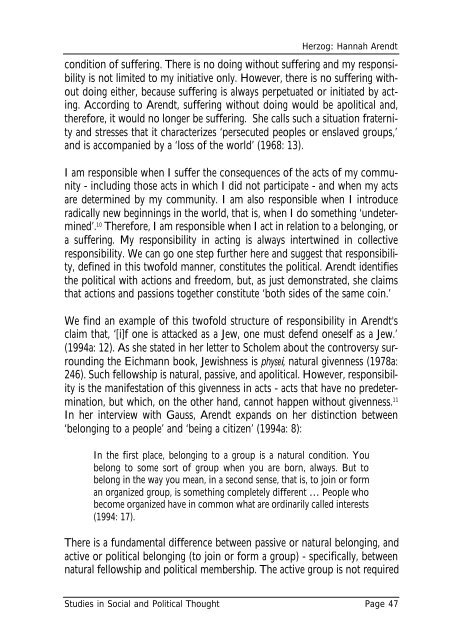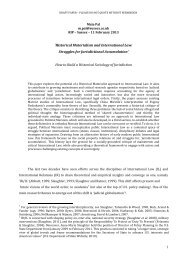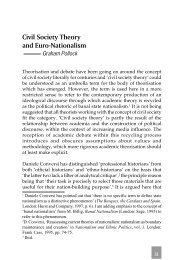Hannah Arendt's Concept of Responsibility - University of Sussex
Hannah Arendt's Concept of Responsibility - University of Sussex
Hannah Arendt's Concept of Responsibility - University of Sussex
Create successful ePaper yourself
Turn your PDF publications into a flip-book with our unique Google optimized e-Paper software.
Herzog: <strong>Hannah</strong> Arendt<br />
condition <strong>of</strong> suffering. There is no doing without suffering and my responsibility<br />
is not limited to my initiative only. However, there is no suffering without<br />
doing either, because suffering is always perpetuated or initiated by acting.<br />
According to Arendt, suffering without doing would be apolitical and,<br />
therefore, it would no longer be suffering. She calls such a situation fraternity<br />
and stresses that it characterizes ‘persecuted peoples or enslaved groups,’<br />
and is accompanied by a ‘loss <strong>of</strong> the world’ (1968: 13).<br />
I am responsible when I suffer the consequences <strong>of</strong> the acts <strong>of</strong> my community<br />
- including those acts in which I did not participate - and when my acts<br />
are determined by my community. I am also responsible when I introduce<br />
radically new beginnings in the world, that is, when I do something ‘undetermined’.<br />
10 Therefore, I am responsible when I act in relation to a belonging, or<br />
a suffering. My responsibility in acting is always intertwined in collective<br />
responsibility. We can go one step further here and suggest that responsibility,<br />
defined in this tw<strong>of</strong>old manner, constitutes the political. Arendt identifies<br />
the political with actions and freedom, but, as just demonstrated, she claims<br />
that actions and passions together constitute ‘both sides <strong>of</strong> the same coin.’<br />
We find an example <strong>of</strong> this tw<strong>of</strong>old structure <strong>of</strong> responsibility in <strong>Arendt's</strong><br />
claim that, ‘[i]f one is attacked as a Jew, one must defend oneself as a Jew.’<br />
(1994a: 12). As she stated in her letter to Scholem about the controversy surrounding<br />
the Eichmann book, Jewishness is physei, natural givenness (1978a:<br />
246). Such fellowship is natural, passive, and apolitical. However, responsibility<br />
is the manifestation <strong>of</strong> this givenness in acts - acts that have no predetermination,<br />
but which, on the other hand, cannot happen without givenness. 11<br />
In her interview with Gauss, Arendt expands on her distinction between<br />
‘belonging to a people’ and ‘being a citizen’ (1994a: 8):<br />
In the first place, belonging to a group is a natural condition. You<br />
belong to some sort <strong>of</strong> group when you are born, always. But to<br />
belong in the way you mean, in a second sense, that is, to join or form<br />
an organized group, is something completely different … People who<br />
become organized have in common what are ordinarily called interests<br />
(1994: 17).<br />
There is a fundamental difference between passive or natural belonging, and<br />
active or political belonging (to join or form a group) - specifically, between<br />
natural fellowship and political membership. The active group is not required<br />
Studies in Social and Political Thought Page 47
















